Chances are you’ve heard people talking about how amazing coconut oil is for your dog. And how it can even reduce excessive shedding.
But is this really the case, or is it just another myth?
Here’s what you need to know…
Please note: Coconut oil is generally considered to be safe for dogs, but it’s always best to consult a veterinarian before making any changes to your dog’s diet.
Recommended: Go here to see our top-rated dog hair blow dryers
Does Coconut Oil Help With Shedding, Really?
Yes. Coconut oil can be a very effective, natural, and safe way to help reduce shedding.
Why? Well, before we can answer this, let’s first consider one of the most common causes of excessive shedding – dry, irritated skin.
There are many reasons your dog could have dry, irritated skin too. Some of the more common reasons are overbathing, poor diet, or even an allergic reaction of some kind.
In any case, dry skin causes excessive shedding.
This can also lead to excessive scratching, which further increases the likelihood of shedding and, in some cases, can even result in bald patches.
The good news is that coconut oil can help solve dryness by helping your dog develop healthy, moisture-rich skin and hair.
And the medium chain triglycerides (MCT) within coconut oil are the main reason for this. MCT is a healthy fat and has a range of potential benefits for your dog, other than just helping promote healthy skin and hair.
For example, coconut oil can help ward naturally off fleas, soothe a dog’s skin, relieve itchiness, promote healthy digestion, and benefit dogs in numerous other ways.
No wonder they call it a superfood!
So yes, coconut oil absolutely can help reduce excessive shedding, and it’s a great natural supplement to have around due to its other potential benefits.
What Kind of Coconut Oil Should You Use?
Without a doubt, the best type of coconut oil to use is virgin coconut oil. This is because the nutrient, mineral, and MCT content are higher than with regular coconut oil, and it’s generally just better quality, which is always the way to go when it comes to your fur baby!
Aside from what I just mentioned, one of the main things that separate regular and virgin coconut oil is the source of the oil and how it’s extracted. In short, virgin coconut oil is extracted from fresh coconut milk without heat or exposure to sunlight.
As a result, like most things in life, there’s a higher price to pay for the higher level of quality.
But when you consider how much you will likely be using (not much) and the numerous potential benefits to your dog’s overall coat, I’d say it’s worth it.
Recommended: Go here to see our top-rated dog hair blow dryers
How To Apply Coconut Oil For Shedding (and How Often)
Coconut oil can be applied topically (on your dog’s coat) or orally (feed it to him). And in this section, I’ll explain how to apply coconut oil using both of these methods.
Please keep in mind, however, that it’s always best to speak with a qualified veterinarian (which I am not) before making any changes to your dog’s diet.
Method 1: Add Some Coconut Oil to Your Dog’s Food
This method, in my opinion, is the most likely to benefit a dog since it will not just help with dry skin and hair, but as I mentioned earlier, there are numerous potential benefits to coconut oil in general. And the good news is, most dogs enjoy eating coconut oil!
Start by adding a quarter of a teaspoon of virgin coconut oil to your dog’s food every day or two. It’s important to start with a small amount so as not to disrupt your dog’s digestive system.
Sudden and/ or excessive doses of coconut oil can result in diarrhea, and it’s generally just not good to do anything drastic.
Instead, start with a very small amount and see how your dog reacts to it.
All going well, you may be able to increase the amount over time to a full teaspoon daily, depending on the size of your dog and other factors.
Basically, it’s always best to start with a small amount of coconut oil, and the smaller your dog is, the less you would add to your dog’s food, especially at first.
This is just a general rule of thumb, though. Always monitor the situation (for example, check your dog’s stools) and consult your local vet if you have any concerns at all.
It’s also worth understanding that coconut oil is made up of around 90% saturated fat. And even though it’s a healthy fat and considered safe for most dogs, it is still fat and does contain calories.
This means your dog could gain weight if you feed him too much. So it pays to maintain regular exercise and a healthy, balanced diet to avoid excess weight gain.
Option 2: Apply Coconut Oil to Your Dog’s Coat
This method is simple, effective, and can do the trick if you prefer not to feed your dog any coconut oil.
All you need to do is apply coconut oil to your dog’s coat and thoroughly massage it into his skin. Allow 5-10 minutes for the oil to soak in, lightly rinse the coat, and dry your dog with a towel.
That’s it! Repeat this process weekly or fortnightly for the best results.
Worth noting, too, is that you don’t need to bathe your dog fully after each session because this can strip his coat of the beautiful coconut oils you’ve lathered on the coat. Not to mention, over-bathing itself can (and often does) dry out a dog’s skin.
This is especially true when it comes to using low-quality shampoos or shampoos that are designed for humans, since the chemicals within these can cause dry skin and irritation.
So if you are going to bathe your dog, always use a good quality dog shampoo. And ideally, avoid using shampoo at all after a coconut oil lathering if possible (at least for a day or so).
If you find your dog is still excessively greasy, try massaging the coat further with a dry towel or a dog hair blow dryer. The latter is not necessary, but these are great to have around anyway, as they can help you remove a lot of excess fur after bathing and save you time.
For more tips on reducing shedding, see our complete guide.
Bottom Line
Coconut oil can be a very effective way to help reduce dog shedding.
It can also help with many types of skin irritations and promotes healthy skin and hair, which is exactly what you want when your goal is to get the shedding under control.
That said, most dogs shed at least some hair, so nothing (including coconut oil) will stop the shedding completely. And it’s not like coconut oil is a “magic” way to reduce shedding overnight either, so expect that it will take time to work and that you will likely see the most benefit when using it in conjunction with other methods (such as proper diet and grooming).
Still, coconut oil can help with shedding, and considering it can also benefit dogs in numerous other ways, I’d say that keeping a jar of quality virgin coconut oil on hand is well worth it!
What do you think?
Have you used coconut oil for your dog?
Let us know in the comments below!

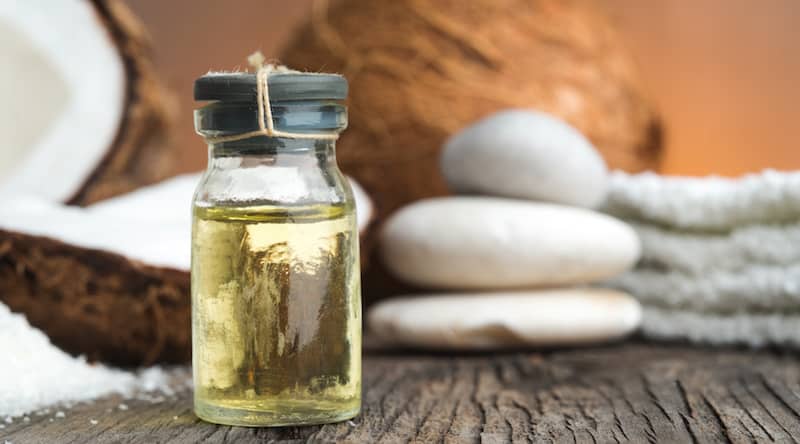

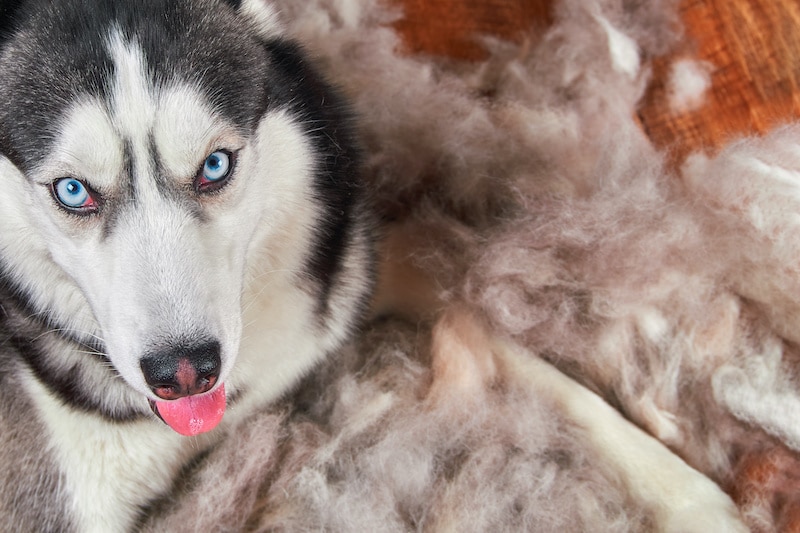

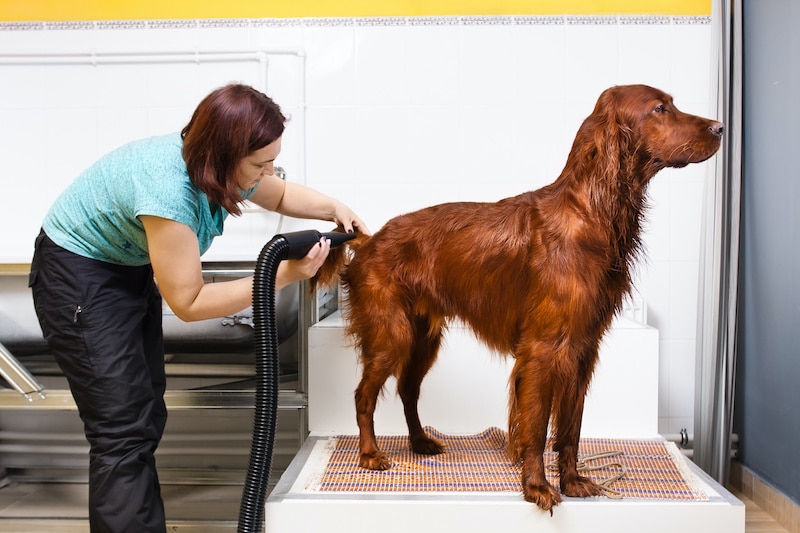



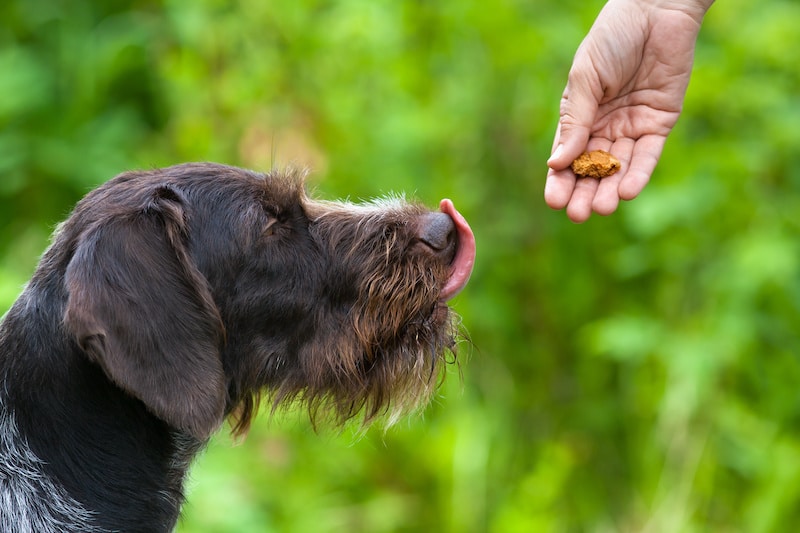

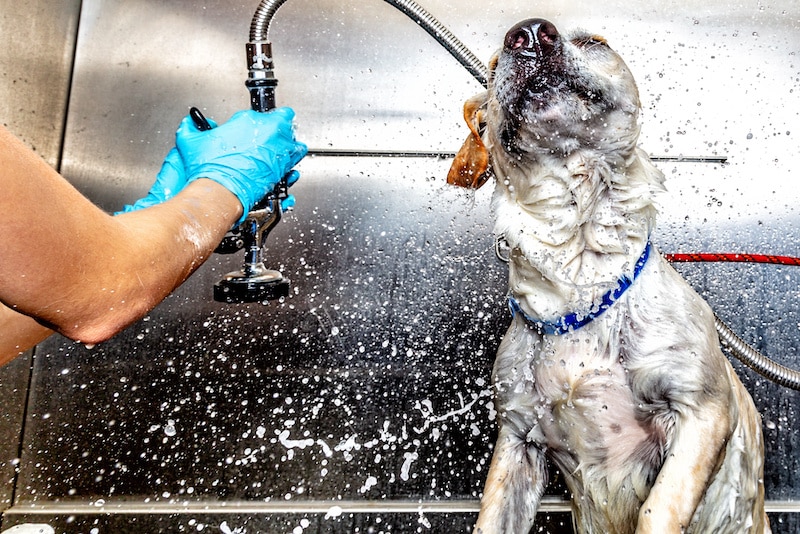
Hi there, I’m very interested in trying coconut oil for my dog’s shedding hair. But do I get the actual liquid which I can’t find or the lard (shortening like texture)?
Hi Kim,
I personally just use a quality virgin coconut oil. Depending on the ambient temperature, it can solidify, but it doesn’t take much to liquify again.
There’s lots of great products out there too. And some are better than others. But the most important thing is that you use a high quality, virgin coconut oil.
Here are some great coconut oils from Amazon (affiliate links) that you may want to check out:
Hope this helps!
Awsome thank you!
I buy mine from Amazon also and if it liquifies I put it in the fridge until it’s solid again. It’s great also for keeping fleas off my dogs. It’s all I use, no toxic medicine and my dogs coats are healthy!
How much oil should be used for a golden retriever who is 65 pounds of totally awesome hair? She sheds terribly all year long? love Lucy but not all the shedding !!!
Hi Cheryl,
First off, apologies for the late reply here I must’ve missed this comment.
I personally start off with half a teaspoon per day, and slowly progress to a teaspoon or sometimes a tablespoon over a period of days or weeks, but never more than this. I’ve found it pays to take it slow and steady so as not to upset my dog’s tummy. I’m not a qualified veterinarian though, so you should contact your local veterinarian before feeding your dog anything you’re not sure about.
Hope this helps. 🙂
If i buy solid coconut oil what is best way to put it into
My french bulldogs food? Do I need to make into liquid for first
What you feed your dog and how you do so is ultimately something you need to decide for yourself and perhaps even discuss with a qualified veterinarian, which I am not.
For me personally, if the coconut oil I have is hard, I simply let it melt at room temperature. Or if it won’t melt sometimes I’ll just dice it up really finely and mix it in. I only ever use a really tiny amount so it’s easy to do.
Hello.. how much virgin coconut oil do you use when you apply it on their coat? My Siberian Husky is shedding so much that I could easy vacuum 2 times a day.
Hi. I sometimes add it to a spray bottle for dogs with thicker coats, as I find this helps me spread it more evenly over the coat and that way I don’t have to use too much.